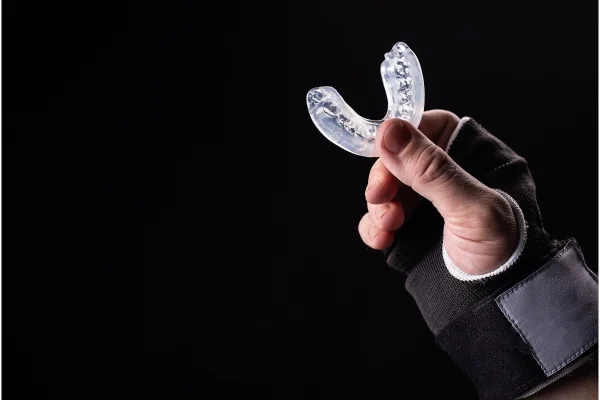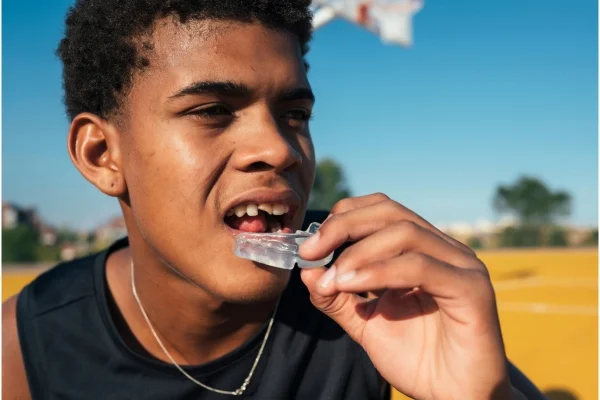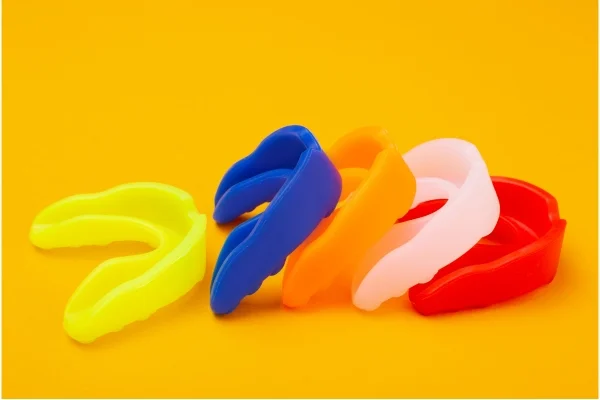For any sports enthusiast out there, including your kids, safety is always on the list of considerations. You have helmets, knee pads, and all the protectors that can be used, well prepared for the action. But have you thought about protecting your teeth? Surprisingly, dental injuries in sports are more frequent than one would think and are usually unnoticed. The most effective protection against sore and bleeding gums and a hefty bill is a sports mouth guard.
A mouth guard is an object that ultimately helps you avoid major problems with your teeth, and it is all just a piece of equipment. Football, basketball, hockey, skateboarding- whatever sport you enjoy, a mouth guard can protect your teeth and decrease the chances of mouth injury. Welcome to this blog where we will explore the reason why a sports mouth guard is the key to aggressive dental defense and how every sporting personality needs to incorporate one.
Why Is a Sports Mouth Guard Important?

Imagine this: What if you’re playing a game of basketball, and suddenly, you catch an elbow to the face? In a split second, a tooth would chip, crack, or even get knocked out. Ouch, right? Accidents like this are quite more common than you think, but a sports mouth guard can be amazing for reducing the chances of such injuries.
They Protect Your Teeth
The first potential advantage is protection. A sports mouth guard provides cushioning to protect the teeth from a blow in the face by dispersing the force of it. A good example is when a footballer is playing without a mouth protector, a strong tackle may lead to a broken tooth or even lead to toothless situations. That makes one wonder how much it would hurt and cost us to address such a situation!
They Shield Your Gums, Lips, and Jaw
Mouth guards are not only used to protect your teeth but also your entire mouth. An ideal mouth guard extends up to the gum line and also protects the internal soft tissues of lips and cheeks from the blows that may result in forming bruises. They also protect your jaw from fractures by helping to absorb and disperse this pressure. Further, some studies indicate that perhaps the use of a mouth guard can decrease the chances of concussion but more research is required.
They’re Required in Many Sports
Some sports that involve contact, such as football, rugby, and hockey, require one to wear mouth guards when playing. But it is not only these close-contact sports through which dental traumas occur. In more ‘sedate’ activities like basketball, gymnastics, or martial arts, mishaps can also happen. Carrying a mouth guard as if it is part of the normal outfit often gives one the comfort of preparing for anything.
How Do Sports Mouth Guards Work?

You might be wondering how exactly a sports mouth guard works to protect your teeth. It’s actually pretty straightforward. When you’re hit in the face, the impact creates a force that can damage your teeth, gums, and jaw. A mouth guard acts as a shock absorber, dispersing that force and reducing the impact.
Absorbs Impact
A mouth guard that fits correctly works as a shield, so there will be little to no contact between the teeth. For instance, when you get a punch in the face, the guard helps distribute the impact across the teeth and gums, thus reducing the force. The force is not focused on just one tooth as in typical bracing but is distributed by the guard.
Cushions the Jaw and Reduces Injury to Soft Tissue
Besides guarding your teeth, a mouth guard also comes as a cushion for the jaw. When you are struck on the face, the impact can move through the jaw onto the other bones of the skull. The guard lessens this force, decreasing the likelihood that you will end up with a broken jaw or some other significant injury. It also helps to avoid accidents where teeth may hit the cheeks, lips, and gums and cause bruises or cuts.
Types of Sports Mouth Guards: Which One Is Right for You?
When it comes to mouth guards, one size definitely doesn’t fit all. There are several types of sports mouth guards available, each offering different levels of comfort, fit, and protection. It’s important to choose the right one based on your sport and needs.
Stock Mouth Guards
This is the simplest of all the mouth guards. They arrive in a packaged form and can be worn in their original design. The upside? They come in cheaper, and you can buy them at any sporting goods store or a store. The downside? They are not oral-specific or custom-fitted so they may not be as comfy, or they may not fit as tightly and properly around your teeth as well as protecting them.
Boil-and-Bite Mouth Guards
Over-the-counter mouth protections are called boil-and-bite which are more flexible and can fit well than mouth guards that are purchased already made. All you do is put the mouth guard in hot water to soften and then you bite to shape it on the teeth. These guards are cheaper and give better protection due to the tight fit. They’re especially common among athletes who want a balance of affordability and protection.
Custom-Fitted Mouth Guards
Custom-fitted mouth guards are made by your dentist specifically for your mouth. They provide the best fit, comfort, and protection but are also the most expensive option. A dentist will take a mold of your teeth and create a guard that perfectly fits your bite. For athletes in high-contact sports or those looking for maximum protection, a custom-fitted mouth guard is worth the investment.
How to Care for Your Sports Mouth Guard
While using a mouth guard, it is necessary to do it properly so that the mouth guard will last longer and can continue to provide optimum protection.
Clean It Regularly
When not in use, always clean your mouth guard in cool water or with mouthwash to eliminate any bacteria or filth. You should also lightly brush it with a toothbrush and some mild soap every now and then to keep it hygienic. It is also necessary not to use hot water, as it will make the material and the fit shrink.
Store It Safely
When not in use, the mouth guard should be placed in a hard-cased container that has ventilation capability. This protects it from being damaged and offers a ventilation system to reduce the growth of bacteria. Do not carry it in your gym bag where it could be squashed or come into contact with dirt, or any other substance for that matter.
Benefits of Using a Sports Mouth Guard for All Ages
Mouth guards aren’t just for professional athletes. Whether you’re a parent with a child in youth sports or an adult playing in recreational leagues, a mouth guard is essential for protecting your teeth. From kids playing soccer to adults participating in competitive sports, the benefits of using a mouth guard go beyond just dental protection.
Prevents Costly Dental Repairs
One of the major benefits of wearing a sports mouth guard is the protection it provides against expensive dental treatments. A cracked tooth, knocked-out tooth, or jaw injury can lead to emergency dental visits and costly repairs, including crowns, bridges, implants, or even jaw surgery. A properly fitted mouth guard serves as a barrier between the teeth and the force of an impact, reducing the likelihood of injuries that require extensive dental work.
Protects Against Concussions and Other Head Injuries
In addition to protecting teeth, a sports mouth guard can also help reduce the risk of more serious head injuries, like concussions. When athletes receive a blow to the jaw, the force can transfer up through the jawbone to the skull, potentially causing a concussion. Some studies suggest that wearing a mouth guard may help absorb and dissipate this force, lessening the impact on the brain.
While mouth guards aren’t a guaranteed way to prevent concussions, they can be an important part of a comprehensive safety strategy, especially in high-contact sports like football, hockey, and boxing.
How to Choose the Right Sports Mouth Guard
Now that we’ve established the importance of wearing a sports mouth guard, the next step is figuring out which type is best for you or your child. Not all mouth guards are created equal, and finding the right one depends on factors like comfort, durability, and the type of sport being played.
Assessing Comfort and Fit
In choosing a mouth guard comfort cannot be overlooked as it plays a critical role when choosing the mouth guard. Your child will not use it properly because you have put a mouth guard which is uncomfortable with your child so there’s no longer a purpose. Dentist-made mouth guards provide the most comfort since they are designed to be worn by the specific athlete due to their ability to be shaped to the teeth. Though these short-link socks are a bit pricey, the level of comfort they offer their wearers and the fit is unbeaten.
Hence boil-and-bite mouth guards fall in between the two. These guards are made of thermostable plastic, which becomes plastic and soft when in boiling water. The athlete thus chews on the softened guard so that it fits directly on the teeth providing a semi-personalized shape. They cost relatively low and protect teeth fairly well, but can be somewhat uncomfortable, especially for extended use, and are not as well fitting as custom mouth guards.
Stock mouthguards are cheaper than the custom made because they are molded and do not cover the teeth perfectly because they are pre-formed. They are mostly too massive, and one literally feels choked or cannot find words to say in their presence.
Matching the Mouth Guard to the Sport
It should be understood that leisure activities are particular, and the mouth guard to be worn should match the required level of protection. For example, football, hockey, and boxing are categorized under contact sports, they should cover their teeth with guards which should be more protective and more resistant. In such cases, the mouth guards should be made to order since they are capable of bearing forces that are higher than the normal ones.
Moderate contact sports like basketball or soccer as well as gymnastics or the like, for instance, might only require a boil-and-bite mouth guard. These guards are cheaper yet they provide adequate protection of the teeth during dental activities, which are not very dangerous.
However, if you are in doubt as to which of the mouth guards is more appropriate for your particular sports then it would be extremely wise to consult your dentist or orthodontist. They can recommend which guard to put on depending on certain conditions, something that is predicated on your individual needs as well as the risk factor that comes with your activity.
Encouraging Consistent Mouth Guard Use in Kids

Some kids and teenagers can at times find it hard to wear mouth guards all through their activities so it becomes crucial for safety. Fortunately, there are some methods of how to make your child wear the mouth guard without any resistance or tantrums.
Personalize the Mouth Guard
A mouth guard that may feel special or personal to many kids means that they will be more likely to wear it. Some manufacturers provide children with a choice of color – design so that every child can get a guard in their color or sports team’s logo. It can also play a role in encouraging your child to wear the gear during games and practice.
Making Wearing the Mouth Guard Routine
You can make your child develop a routine within the sporting activities by guiding him or her to put on the mouth guard every time he or she practices. As with shin guards or laces, the mouth guard should become routine and part of the preparation that the child does before a game. Remind them that in sports they cannot be safe without it and that includes a mouth guard.
Final Thoughts
A sports mouth guard is essential for athletes of all ages and sports. Whether custom-fitted or boil-and-bite, wearing a mouth guard consistently helps protect against dental injuries and even more serious head trauma. It’s a small investment for the long-term health and safety of your teeth. Prioritize protection, choose the right mouth guard, and keep your smile safe every time you step on the field or court.
FAQs
1. How often should I replace my sports mouth guard?
Mouth guards should be replaced every season or if they show signs of wear like cracks or tears.
2. Can mouthguards prevent concussions?
While not guaranteed, some research suggests mouth guards can reduce the risk of concussions by absorbing impact to the jaw.
3. Do I need a custom-fitted mouth guard?
Custom-fitted mouth guards offer the best fit and protection, especially for high-contact sports, but boil-and-bite options are effective for lower-risk activities.
4. How do I clean my mouth guard?
Clean your mouth guard regularly with cool water and mild soap. Avoid hot water, as it can warp the guard.
